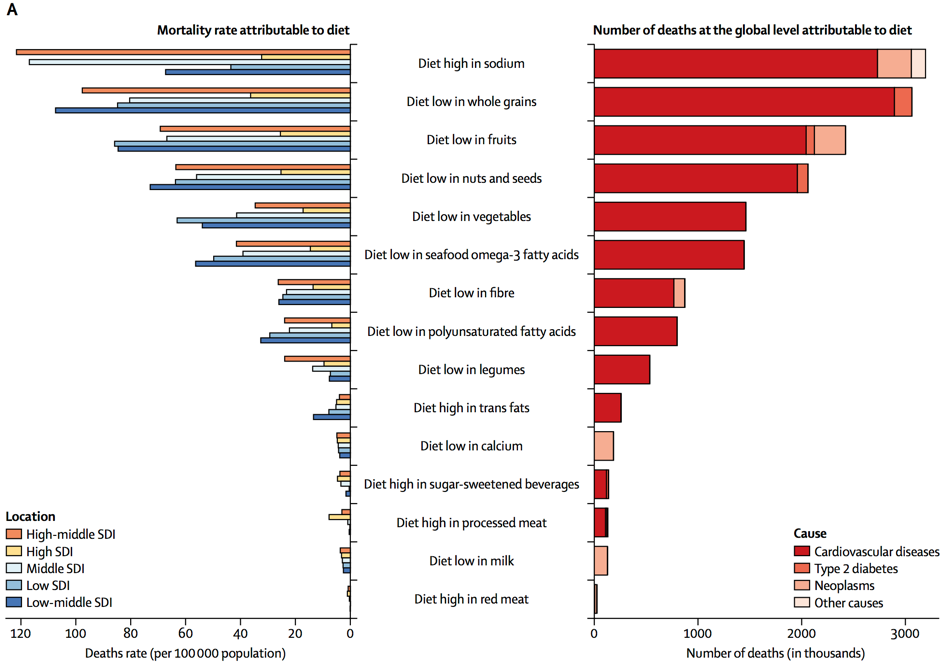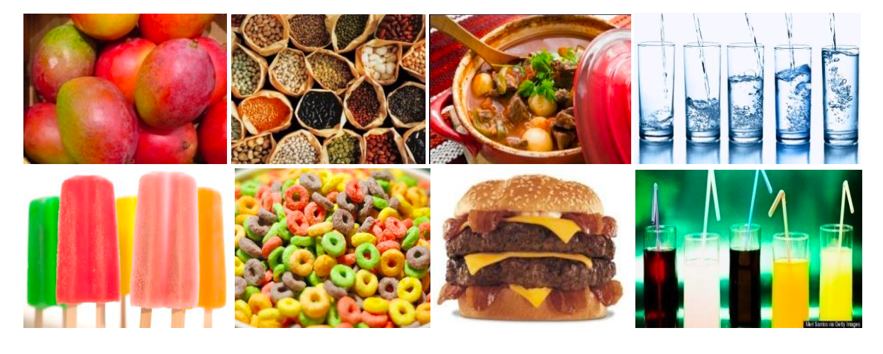Ultra-processed foods, fast food, sugary drinks, industrial pastries, sweets, sugary dairy desserts, fatty foods, and extra salt are foods that are very present in the day-to-day life of many people, who are not really aware of the consequences of their consumption.
Recently, there was the case of a young British man who developed blindness by eating only processed food every day, especially French fries, white bread, ham, and sausages. The case reported in the scientific journal Annals of Internal Medicine states that experts point directly at junk food as the culprit. This leads us to wonder just how aggressive ultra-processed foods can be and the consequences that they may bring for our health.
Alejandro Monzó – Neolife Nutrition Unit
Our diet has become one of the main risk factors for losing our health
Bad lifestyle habits have become the greatest threat to global health. According to the study published by The Lancet, an unbalanced diet was linked to 11 million deaths in 2017 worldwide (1). This number accounts for one-fifth of the world’s 57 million deaths annually, and is higher than the number of deaths attributed to tobacco (7 million), cancer (8.2 million), heart attacks (5.5 million), and obesity (2.8 million). Therefore, the authors point out that one in five deaths in the world is related to poor nutrition.
The study finds that while the impact of individual dietary factors varies from country to country, three dietary factors such as the low intake of whole grains, fruits, and high salt consumption account for over 50% of diet-related deaths (Figure 1). The other 50% was attributed to the high consumption of red and processed meats, sugary drinks, and trans fatty acids, among other foods.

Too much salt raises blood pressure, which in turn increases the risk of heart attacks and strokes. Salt can also have a direct effect on the heart and blood vessels, which may lead to heart failure. Whole grains, fruits, and vegetables have the opposite effect; they are heart healthy and reduce the risk of heart problems, cancer, and diabetes mellitus (2). The growing evidence across several studies indicates that the Western diet, especially large amounts of meat and ultra-processed foods, is strongly associated with the risk of developing such chronic diseases.
The NOVA system classifies food by its degree of processing into four groups, from raw foods to what is known as ultra-processed foods. Ultra-processed foods are industrial formulas made from refined ingredients (sugar, starches, vegetable oils, salt) or synthesized components (trans fats, hydrolyzed protein, additives) and do not contain any recognizable whole foods (Figure 2). They generally have more than five ingredients, are nutritionally unbalanced, have high palatability (they are extremely tasty), and are easy to consume (3).
More and more studies show the health hazard of eating this type of “food”. A new study of 20,000 volunteers published in the British Medical Journal shows that consuming more than four servings a day of ultra-processed foods translates to a 62% higher risk of all causes of mortality. Moreover, for each additional serving the risk grows by 18%, the authors state (4).
However, we must not forget that in addition to the consumption of processed foods, the consumption of sugary drinks further aggravates the situation. The largest study to date in Europe has just been presented in the JAMA Internal Medicine journal. The results show that people who drink two glasses of soda daily, i.e. half a liter, have a 17% higher risk of premature death than casual consumers who drink one glass a month at most (5). The analysis of nearly half a million Europeans considers both sugary and sweetened beverages with artificial sweeteners.

In reference to the case of the young Brit diagnosed with blindness, the patient confessed that since primary school, he’d eaten a daily serving of French fries, sausages, white bread and ham, and had avoided at all costs many foods that were unpleasant because of their texture (6). His poor diet had caused him to be deficient in vitamin B12, and also produced low levels of copper, selenium, vitamin D, and bone density (7).
After years of bad eating habits, the young man ended up developing a nutritional optic neuropathy. The recent scientific evidence we’ve reviewed has linked ultra-processed foods to a risk to physical health, but this case has surprised the scientific community. The authors conclude that it is important to explore the psychological damage caused by these foods,, since it is the first clinical case of blindness from a consumption of junk food associated with an eating disorder (6).
Therefore, researchers emphasize that a poor diet may lead to poor cardiovascular health, obesity, and cancer, all associated with the consumption of this type of food. Poor nutrition goes further and may significantly damage the nervous system. A recent study of over 14,000 volunteers from the SUN Cohort Study (Seguimiento University of Navarra) concludes that regular consumption of ultra-processed foods is associated with a higher risk of developing clinical depression in the future (8).
Here at Neolife, we wish to convey the importance of eating a proper diet and leading a healthy and active lifestyle. The scientific evidence pointing to the health problems associated with eating this type of food is becoming more and more robust. These include chronic diseases, such as cardiovascular disease, obesity, cancer, and diabetes to psychological disorders and clinical depression. Disease prevention and achieving a higher quality of life are the goals of our nutrition and medical team, and so we send this message to raise awareness and communicate that what you do on a day-to-day basis counts. The proper diet, often forgotten, is a fundamental pillar for our health.
BIBLIOGRAPHY
(1) GDT 2017 Diet Collaborators. (2019). “Health effects of dietary risks in 195 countries, 1990-2017: a systematic analysis for the Global Burden of Disease Study 2017”. The Lancet.
URL: https://www.thelancet.com/journals/lancet/article/PIIS0140-6736(19)30041-8/fulltext
(2) Mozaffarian, D. (2017). “Foods, obesity, and diabetes – are all calories created equal?”. Nutr. Rev, 75(1): 19-31.
URL: https://www.ncbi.nlm.nih.gov/pubmed/28049747
(3) Monteiro C.A. et al. (2016). “NOVA. The star shines bright”. Food classification. Public health. World Nutrition January-March 2016, 7, 1-3, 28-38.
(4) Rico, C.A. et al. (2019). “Association between consumption of ultra-processed foods and all cause mortality: SUN prospective cohort study”. BMJ.
URL: https://www.ncbi.nlm.nih.gov/pubmed/31142450
(5) Mullee A. et al. (2019). “Association between soft drink consumption and mortality in 10 European countries”. JAMA Intern Med.
(6) Harrison, R. et al. (2019). “Blindness caused by a junk food diet”. Annals of Internal Medicine.
URL: https://annals.org/aim/article-abstract/2749497/blindness-caused-junk-food-diet?searchresult=1
(7) El Mundo. (2019). “Un joven se queda ciego tras basar su dieta durante años en patatas fritas, pan blanco, jamón y salchichas” [A young man goes blind after eating a diet of French fries, white bread, ham, and sausages for years]. Science and Health.
URL: https://www.elmundo.es/ciencia-y-salud/salud/2019/09/04/5d6f903efc6c8347488b4617.html
(8) Gómez-Donoso, C. et al. (2019). “Ultra-processed Food consumption and the incidence of depression in a Mediterranean cohort: the SUN Project”. Eur J Nutr.
URL: https://link.springer.com/article/10.1007%2Fs00394-019-01970-1
